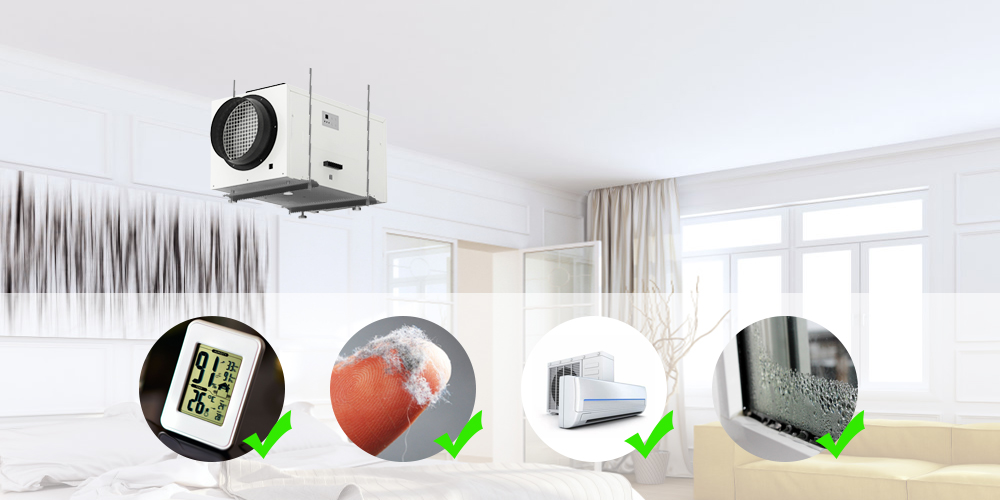Whether or not use a dehumidifier in the summer depends on the specific conditions and environment of your living space.
Conditions that you need to use a dehumidifier
Humidity Levels
If your area experiences high humidity levels during the summer, using a whole house dehumidifier with pump can help create a more comfortable indoor environment. High humidity can make the air feel heavy and muggy, leading to discomfort, mold growth, and potential damage to your belongings.
Health Concerns
Excessive humidity can contribute to the growth of mold, mildew, and dust mites, which can trigger allergies or respiratory issues. Using a whole home dehumidifier can help reduce these allergens and create a healthier living space, especially if you or anyone in your household is sensitive to such allergens.
Cooling Efficiency
Household dehumidifiers can also indirectly enhance your cooling system's efficiency. When the air is less humid, it feels cooler, allowing you to set your air conditioner to a higher temperature without sacrificing comfort. This can help reduce energy consumption and save on cooling costs.
Condensation Issues
If you notice excessive condensation on windows, walls, or other surfaces, it could be a sign of high humidity. Using a dehumidifier can help mitigate condensation problems and prevent moisture-related damage to your home.
Unnecessary conditions of using a dehumidifier
However, there are situations where using a dehumidifier in the summer might not be necessary:
Low Humidity
If you live in an area with naturally low humidity levels, using a dehumidifier may not be beneficial or necessary. In such cases, using natural ventilation, fans, or air conditioning alone may be sufficient to maintain a comfortable indoor environment.
Dry Climate
If your area experiences dry summers with low humidity, using a dehumidifier can potentially make the indoor air too dry, leading to discomfort, dry skin, and respiratory issues. In such situations, it is best to focus on proper hydration and maintaining a comfortable moisture balance.
Ultimately, the decision to use a dehumidifier in the summer depends on your specific circumstances. Assess the humidity levels in your home, consider any health concerns, and evaluate the benefits of reduced humidity in terms of comfort and energy efficiency. If you are unsure, it's always a good idea to consult with a professional or an HVAC specialist who can provide personalized advice based on your situation. Preair is a professional dehumidifier manufacturer that can provide you with different types of dehumidifiers. Contact us if you require bulk dehumidifiers.
What to set dehumidifier at in summer?
The ideal humidity setting for a dehumidifier in the summer can vary depending on your personal preferences and the specific conditions in your home. However, a general guideline aims for a relative humidity (RH) level between 30% and 50%. Here are a few considerations to help you determine the appropriate setting:
1. Start with 50% RH: Setting your dehumidifier to 50% RH is a good starting point. This level balances comfort and prevents mold growth or excessive moisture-related issues. It's a common recommendation for indoor humidity levels.
2. Adjust based on comfort: If you find that the air still feels too humid or if you experience condensation on windows or surfaces, you can lower the dehumidifier's setting gradually until you achieve a comfortable level. However, be cautious not to set it too low, as extremely low humidity can cause dryness and discomfort.
3. Consider health concerns: If you or someone in your household has allergies or respiratory issues, you may want to aim for a slightly lower humidity level, closer to 30% to help reduce allergens like mold and dust mites.
4. Monitor outdoor conditions: Keep an eye on the outdoor humidity levels, as they can impact the indoor humidity. If your area experiences particularly humid days, you may need to adjust the dehumidifier's setting accordingly to maintain a comfortable indoor environment.
5. Avoid excessive dryness: While it's important to reduce humidity, overly dry conditions can lead to dry skin, respiratory discomfort, and other issues. If you notice these symptoms or excessive dryness in your home, consider increasing the humidity slightly or using other methods like plants or humidifiers to add moisture back into the air.
Remember that achieving the perfect humidity level is subjective and can vary depending on personal preferences. It's a good idea to experiment with different settings and monitor the indoor conditions to find what works best for you and your home.
Post time: Jun-01-2023


